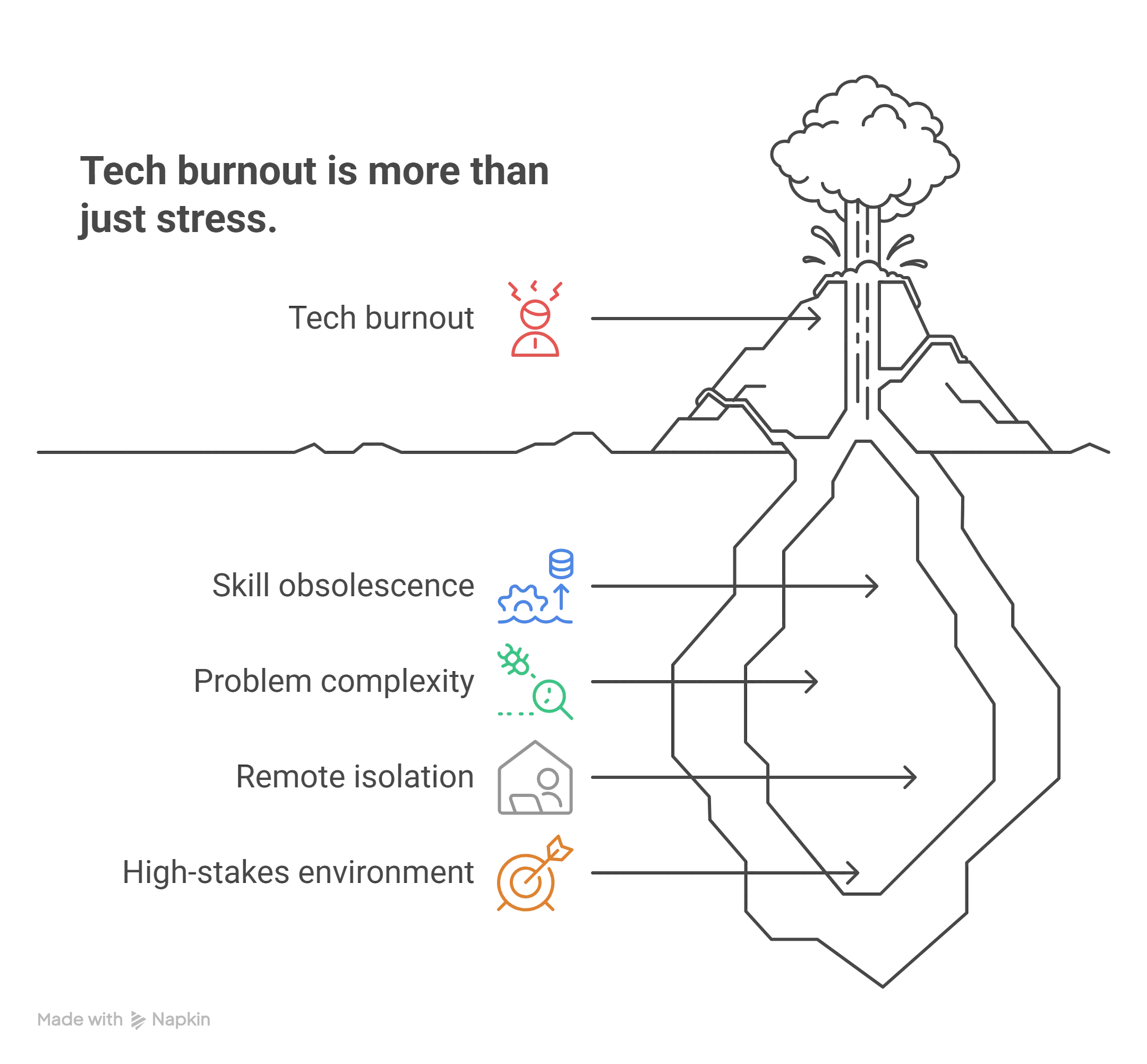
Imposter syndrome tech workers know this feeling all too well: you're debugging code that stumped everyone else, but instead of feeling proud, you're convinced it was pure luck. Recent research by Hays shows that 68% of women and 61% of men in tech experience imposter syndrome, making it one of the most affected industries. Whether you're a software developer, IT specialist, or anywhere in between, that nagging voice saying "I don't belong here" is more common than you think—and yes, even that senior engineer you admire deals with it too.
Why Imposter Syndrome Hits Tech Professionals So Hard
The tech world creates a perfect storm for self-doubt. Unlike other fields where mastery feels more tangible, technology evolves at breakneck speed—yesterday's cutting-edge framework is today's legacy code. This constant learning cycle can make even experienced developers feel like beginners.
Tech-specific triggers include:
- Rapid skill obsolescence: New programming languages and frameworks emerge constantly
- Complex problem-solving: Debugging can feel like magic when it finally works
- Remote work isolation: Limited face-to-face interaction with peers
- High-stakes environment: Code errors can have significant business impact

The "10x developer" myth doesn't help either. This cultural narrative suggests some programmers are inherently gifted, making others feel inadequate when they need time to solve problems or look up documentation. Interestingly, MIT research suggests that people with workplace impostor thoughts often become stronger team players, though this doesn't diminish the emotional toll these feelings take.
Recognizing Imposter Syndrome in Tech Roles
Imposter syndrome tech manifestations often look different than in other industries. You might recognize these patterns in your own experience:
The perfectionist programmer spends hours refactoring code that already works perfectly, afraid someone will judge their "messy" solution. They often miss deadlines because nothing feels "good enough" to submit.
The over-researcher reads every Stack Overflow thread and documentation page before writing a single line of code, paralyzed by the fear of doing something "wrong."
"I always felt like I was one Google search away from being exposed as a fraud, even after five years as a software engineer." - Anonymous developer survey response
The silent contributor has great ideas during code reviews but rarely speaks up, assuming their input isn't valuable compared to more "experienced" team members.
Sound familiar? These behaviors aren't character flaws—they're common responses to the unique pressures of working in technology.
How AI and Automation Amplify Tech Imposter Syndrome
The rise of AI coding assistants like GitHub Copilot, ChatGPT, and automated testing tools has created a new wave of imposter syndrome tech professionals never had to face before. When an AI can generate functional code in seconds, many developers question their own value and expertise.
Common AI-related imposter thoughts include:
- "If AI can write this code, am I even needed?"
- "Am I cheating by using AI tools for problem-solving?"
- "What if my manager finds out I use Copilot for basic functions?"
- "Everyone else seems to be an AI expert already"
This anxiety is understandable but misguided. The most successful developers are learning to work with AI tools rather than compete against them. Just as calculators didn't eliminate mathematicians, AI coding assistants won't replace thoughtful software engineers.
"AI tools are making me a better developer, not replacing me. I spend less time on boilerplate and more time on architecture and user experience." - Senior Software Engineer, Fortune 500 company
Reframing AI in your tech career: Think of AI as a sophisticated autocomplete rather than a replacement. You still need to understand the code it generates, debug issues, make architectural decisions, and communicate with stakeholders. These human skills become more valuable, not less, in an AI-augmented workplace.
The key is transparency and continuous learning. Most tech companies encourage AI tool usage for productivity—hiding it often creates more problems than embracing it openly. Consider discussing AI integration strategies with your team rather than suffering in silence about whether you're "allowed" to use these tools.
Building Confidence in Your Tech Career
Here's what actually works to combat imposter syndrome in tech roles:
Document your problem-solving wins. Keep a simple log of bugs you've fixed, features you've built, or problems you've solved. When self-doubt creeps in, this evidence speaks louder than that inner critic. Include the context—what made the problem tricky and how you approached it.
Embrace being a perpetual learner. The most successful tech professionals aren't those who know everything; they're the ones comfortable with not knowing everything. The evolving tech landscape means everyone is constantly learning new skills.
Find your tech community. Join developer Discord servers, attend local meetups, or participate in open source projects. You'll quickly realize that everyone struggles with similar challenges—senior developers included.
| Challenge | Reframe Strategy | Action Step |
|---|---|---|
| "I don't know this technology" | "I'm learning this technology" | Set aside 30 minutes daily for skill building |
| "My code isn't elegant" | "My code solves the problem" | Focus on working solutions, then optimize |
| "I'm not a 'real' developer" | "I solve problems with code" | List three problems you've solved this week |
Practical Strategies for Tech Teams
Individual strategies help, but team culture makes the biggest difference. If you're in a leadership position, consider these approaches:
Normalize learning in public. Share your own learning moments—when you discovered a new debugging technique or had to research unfamiliar concepts. This models that continuous learning is expected, not a sign of inadequacy.
Create psychological safety in code reviews. Frame reviews as collaborative learning rather than judgment. Google's engineering practices emphasize constructive feedback that helps developers grow.
Celebrate diverse problem-solving approaches. When someone solves a problem differently than expected, highlight the creativity rather than focusing on whether it matches the "standard" approach.
For individual contributors, remember that asking questions demonstrates engagement, not incompetence. Strong professional relationships are built on collaborative problem-solving, not pretending to have all the answers.
Long-term Career Development
Building lasting confidence in your tech career requires consistent action over time. Set learning goals that excite rather than overwhelm you. Maybe it's contributing to an open source project, learning a new framework, or exploring free programming resources in an area that interests you.
Track skill progression, not just knowledge acquisition. Instead of feeling pressure to master every new technology, focus on becoming better at fundamental skills like debugging, system design, or user experience thinking. These transferable skills build confidence that transcends specific technical stacks.
Remember that career growth in tech isn't linear. The path from junior developer to senior engineer isn't just about accumulating technical knowledge—it's about developing judgment, communication skills, and the ability to mentor others through their own learning journeys.
Moving Forward with Confidence
Imposter syndrome tech workers face is real, but it's not permanent. By understanding why these feelings are so common in our industry, recognizing the patterns in yourself, and taking concrete steps to build confidence, you can transform self-doubt into fuel for growth.
Start small today. Document one recent problem you solved, reach out to one person in your tech community, or simply acknowledge that the complexity you're dealing with is genuinely challenging—not a reflection of your inadequacy.
Your technical skills brought you this far. Trust them to carry you forward.
Frequently Asked Questions
Do senior developers experience imposter syndrome tech challenges?
Absolutely. Many senior developers report increased imposter syndrome as their responsibilities grow. Leadership roles, architecture decisions, and mentoring others can trigger new waves of self-doubt, even for highly experienced professionals.
How common is imposter syndrome in IT compared to other tech roles?
IT professionals experience imposter syndrome at similar rates to software developers—around 58% according to industry studies. System administrators, network engineers, and cybersecurity specialists face unique triggers like rapidly evolving threats and complex troubleshooting scenarios.
Should I mention imposter syndrome during tech job interviews?
Focus on demonstrating your problem-solving approach rather than discussing self-doubt. Instead of "I have imposter syndrome," try "I'm comfortable working with technologies I'm still learning" or "I enjoy collaborative problem-solving when facing unfamiliar challenges."
Can imposter syndrome affect my performance in coding interviews?
Yes, but preparation helps. Practice explaining your thought process out loud, get comfortable saying "I'm not sure, but here's how I'd approach it," and remember that interviewers often value problem-solving methodology over perfect solutions.
How do I support a teammate dealing with imposter syndrome in tech?
Share specific examples of their valuable contributions, ask for their input on technical decisions, and model vulnerability by admitting when you're learning something new. Sometimes simply saying "I've felt that way too" can be incredibly powerful.
Does working remotely make imposter syndrome worse for tech workers?
Remote work can amplify feelings of isolation and make it harder to gauge your performance relative to teammates. Combat this by scheduling regular one-on-ones, participating in virtual coffee chats, and being more intentional about celebrating wins with your team.